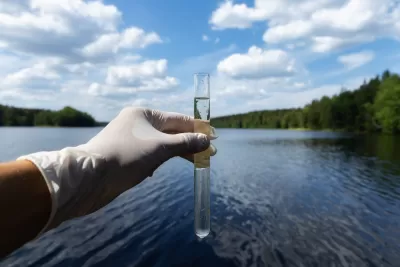The research is the first of its kind to analyze the relationship between freshwater monitoring and the race and ethnicity of nearby communities.

New research from Michigan State University reveals that lakes in U.S. communities of color are three times less likely to be sampled for water quality than lakes in white communities. “The disparity was even larger when taking into account lakes that have been monitored for 15 years or more. Lakes in communities of color were seven times less likely to have long-term monitoring data than lakes in white communities.”
The researchers used data from LAGOS-US and the U.S. Census to cross-reference lake inspections with the race and ethnicity of communities around them. According to Professor Patricia Sorrano, “To the best of our knowledge, our study is the first to examine the availability of lake water quality monitoring data at the national scale from an environmental justice perspective.”
Professor Kendra Spence Cheruvelli outlined their recommendations: “We encourage local, state or regional environmental monitoring programs to include equity in their sampling designs by selecting which lakes to sample based not only on natural features (such as lake size or land use) but also on social features such as race and ethnicity of the nearby communities.”
FULL STORY: MSU researchers find US lakes in communities of color are monitored less for water quality

Alabama: Trump Terminates Settlements for Black Communities Harmed By Raw Sewage
Trump deemed the landmark civil rights agreement “illegal DEI and environmental justice policy.”

Planetizen Federal Action Tracker
A weekly monitor of how Trump’s orders and actions are impacting planners and planning in America.

The 120 Year Old Tiny Home Villages That Sheltered San Francisco’s Earthquake Refugees
More than a century ago, San Francisco mobilized to house thousands of residents displaced by the 1906 earthquake. Could their strategy offer a model for the present?

In Both Crashes and Crime, Public Transportation is Far Safer than Driving
Contrary to popular assumptions, public transportation has far lower crash and crime rates than automobile travel. For safer communities, improve and encourage transit travel.

Report: Zoning Reforms Should Complement Nashville’s Ambitious Transit Plan
Without reform, restrictive zoning codes will limit the impact of the city’s planned transit expansion and could exclude some of the residents who depend on transit the most.

Judge Orders Release of Frozen IRA, IIJA Funding
The decision is a victory for environmental groups who charged that freezing funds for critical infrastructure and disaster response programs caused “real and irreparable harm” to communities.
Urban Design for Planners 1: Software Tools
This six-course series explores essential urban design concepts using open source software and equips planners with the tools they need to participate fully in the urban design process.
Planning for Universal Design
Learn the tools for implementing Universal Design in planning regulations.
Clanton & Associates, Inc.
Jessamine County Fiscal Court
Institute for Housing and Urban Development Studies (IHS)
City of Grandview
Harvard GSD Executive Education
Toledo-Lucas County Plan Commissions
Salt Lake City
NYU Wagner Graduate School of Public Service





























